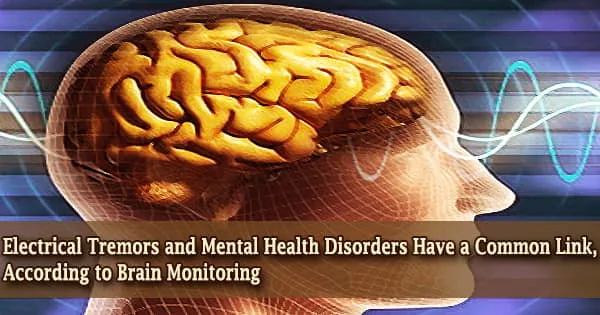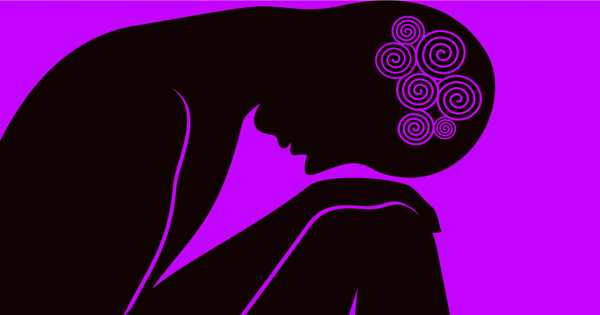The Institute of Psychiatry, Psychology & Neuroscience (IoPPN) at King’s College London conducted a new review of current literature and discovered that irregular brain responses to challenging tasks and mistakes could be key to understanding common links between abnormal behaviors in a variety of mental illness and cognitive disorders.
The researchers looked at studies that used EEG, an electrophysiological monitoring tool to capture electrical activity on the scalp, to quantify short electrical tremors, which are naturally occurring electrical vibrations produced in locations near the front of the brain.
They discovered that brain waves, known as ‘theta activity,’ in persons with illnesses like anxiety, OCD, and ADHD are different following errors or hard situations compared to theta activity in those with healthy brains after aggregating the information from the investigations.
The findings, which were published today in Biological Psychiatry, demonstrate that diseases like anxiety, OCD, and ADHD are closely associated to brainwaves in the midfrontal area of the brain that swing in continuously different patterns from healthy brains.
From our review, we see that a healthy brain is one in which we see consistent levels of theta activity at the right moments. Theta activity in an anxious person for example is imbalanced over time compared to someone without anxiety. Someone experiencing anxiety, while able to take in new information, isn’t able to alter their cognitive behavior effectively going forward because they are overfocussed on reacting immediately to environmental stimuli. Consistency and balance in these signals are thought to be essential for effective communication between brain regions, and appropriate and timely responses to our environment.
Dr. Grainne McLoughlin
The researchers believe that future study into theta activity measures has the potential to improve diagnostic procedures and the efficacy of already accessible therapies such as CBT.
Theta frequency oscillations are increasingly being recognized as being linked to behavioral and cognitive regulation, which are characteristics of healthy conduct, and disruption of these oscillations has been linked to a variety of mental diseases. Theta-related signals work in ways that differ from those observed in healthy brains in more than one form of mental illness, according to this study.
For example, research reveals that anxious people have a much greater level of frontal-midline theta activity than non-anxious people, which might be linked to more reactive control patterns of behavior in the present rather than proactive activities like planning and preparation.
The Eriksen Flanker test is used in several research to study this. The response time of participants is tested by asking them to hit the right button while being distracted.
Following a mistake, nervous people’s response time is harmed because their concentration is focused on the error they just made rather than the work at hand. This might explain how worry impacts behavior because it depletes the mental capacity required for the active maintenance of task norms and goals.
In comparison, the review discovered that dysregulation of theta signals during task performance resulted in a distinct sort of deleterious effect on performance.
Individuals with ADHD’s theta activity increases either too early or too late in response time assessments, making it impossible for them to make an acceptable judgment based on what they observe. Those with drug use disorders have similar degrees of dysregulation.
Dr. Grainne McLoughlin, the study’s first author from King’s IoPPN said, “From our review, we see that a healthy brain is one in which we see consistent levels of theta activity at the right moments. Theta activity in an anxious person for example is imbalanced over time compared to someone without anxiety. Someone experiencing anxiety, while able to take in new information, isn’t able to alter their cognitive behavior effectively going forward because they are overfocussed on reacting immediately to environmental stimuli. Consistency and balance in these signals are thought to be essential for effective communication between brain regions, and appropriate and timely responses to our environment.”
Dr Scott Makeig, the study’s Lead Investigator from the University of California San Diego and who has long investigated ways to map and model frontal theta activity, said, “Frontal midline theta complexes in scalp-recorded brain electrical signals play essential roles in these transient theta network events which also seem to synchronize higher-frequency activities to regulate communication between brain executive, sensory and motor areas supporting quick behavioural responses and situational awareness of their consequences. This review suggests a role of abnormalities in these theta network events in producing a range of symptoms associated with mental illness.”
According to the researchers, this study has the potential to improve diagnoses and define future therapies.
Dr McLoughlin said, “Analysis of these brainwaves shows that certain brains may be programmed to respond suboptimally to the environment. Improving the consistency and balance of these signals in the brain may be an important first step as there is the potential to improve the effectiveness of treatments like Cognitive Behavioural Therapy (CBT). Our research shows that without consistency and balance in theta oscillations, it can be difficult to process new information and voluntarily guide behavior. This research in time could help clinicians to have greater consideration for how the brain responds to situations so that therapies like CBT can be applied more effectively.”
This study was possible thanks to funding from the Medical Research Council UK.
















